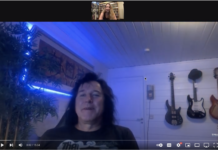As Steve Morse recalls his first inspiration to play guitar, memories of initially playing the clarinet (because his brother played the clarinet); loving the Beatles for Lennon’s mid-range sound, Harrison’s guitar sound and McCartney’s melodic bass; and even his first guitar and the first song that he ever learned came rushing back…
“Playing the guitar was not about me discovering music but just being able to play more stuff on my own. With a woodwind instrument you can’t really do anything other than play melody – for me. I wanted to hear chords and more powerful stuff coming out of it.
So, the first time I saw somebody play it was at the little county fair. There was a guy working one of the booths, sitting kind of behind it. I just snuck in between the booths and kind of watched him just from a foot away. He was finger picking kind of like (he demonstrates on his guitar a simple Dixie melody) just a simple thing like that. I thought that was the coolest thing in the world. I was blown away that the guitar could make music. It wasn’t just that you had to be in a band, you could make music by yourself. I was really sold.
My brother took a few guitar lessons, and I had a guitar – somewhere my grandmother had found a guitar in her attic or something. It turned out to be useless and unplayable because it was broken and cracked and the neck was bent. I took it to this group guitar lesson, you know, ten people sitting around in a circle. Basically, the first lesson is tuning up your guitar, and when he got to mine he says ‘you can’t play this.’ I said, ‘I know that’s why I’m here.’ (laughs) He said, ‘No, really, nobody can play this.’ So, I ended up renting a guitar for about the first year – five bucks a month, a Gibson Acoustic. I tried as hard as I could and I could not make it sound like the Beatles…”
After two days, Morse was playing a song, but when it got to the point that the instructor was only transposing songs off the radio, he says he knew it was time to expand his knowledge in other ways.
“I just played in a band and transcribed my own stuff. I played in my brother’s band, and at some point as a teenager I got real serious, more into the soloing, and realized I was going to do it for the rest of my life. My parents were good enough to put me in a University that would allow guitar to be part of your education. There were very few of the at that time, the only one on the East Coast, in the South East at all that I knew of was the University of Miami.”
Having jammed on tunes from Yes, Hendrix, Deep Purple, and other rock artists, Morse made it a priority to learn to also play classical guitar after being blown away by the head of the guitar department at the University of Miami, who had perform in his hometown in Georgia.
After attending school, Morse says that he’d performed in a few bands before founding the Dixie Dregs with Andy West. After their band the Dixie Grits disbanded, he jokes, the Dregs were all that was left, and they became the Dixie Dregs, and started the band as a three-piece instrumental group.
Morse jokes, “We felt like most of our problems up to that point had come from singers. So, we went totally for the music, which suited me fine, because some people give that line ‘well we’re really in it for the parties and the girls and the money and everything’. Well, if you follow my career, you can see that there was never a career decision ever made in that direction. It was always kind of heading for the most obscure place. We were just hoping to buy food at some point in our lives.”
After working about eleven years straight with never really more than a few days off between gigs and writing and recording albums, Morse says that after about the sixth album, personnel changes, drugs, and the full-time commitment the band demanded tore him away from his music.
“I just got a little bit sick of the whole arrangement…I had enough. So, this was in the early eighties, and I quit. In fact, I didn’t just quit the band, I quit playing, and I learned how to make a living. I had a farm, and I had a bulldozer. I tried to dig ponds for people and clear trees and bail hay for people…I was just doing anything I could to just not make my living as a musician. I didn’t want to quit playing, but I did want to quit the music business, and that got old pretty quick. Sometimes, it’s good, you don’t know how good you got it until you try something else, and I think trying to maintain farm equipment and working out in the sun all day and fixing stuff all night is a great way to appreciate the gig you had before, which I eventually did.”
While Morse was eventually ready to return to his music, he was not prepared to resurrect the Dregs quite yet, because he needed to keep control over what was happening in whatever band he would work with and also because the others had already moved on at that time. Instead, he started his own project after asking a booking agent if he could get him some gigs on his own.
“With the Dregs I had a lot of musical control, but the organization was out of control. No matter what we did or how many records we had out or whatever happened we always just had a high overhead and we were on a subsistence type salary, nothing more.” he explained.
The Steve Morse Band was formed in 1983 by Morse along with two musicians from North Carolina, who had opened for the Dregs once. Their first album, ‘Introduction’ (1984) was released on Elektra Records, but soon after the release of their second album there was yet another bump in Morse’s career.
“I always thought these guys were good enough to do it, and sure enough, no problem. They learned some Dregs tunes…and I wrote some new things that would suit this trio…so we had a record deal somehow, and it worked great. People liked it. I liked it, and as we got enough gigs, I said we really gotta go for the big one. So, I bought a truck and took out a big loan and got an airplane for us to travel in, and my plan was that over the course of ten years, that I could pay off the airplane just not using the airlines, which is what we did, and I still have that plane and still use it for some shows.”
A few years later, after the release of their second album, however, Morse says when they had gotten the slot opening for Rush it was another pivotal time in his career.
“It was kind of a weird time, because the record company had put out my second album, and there was a change from albums to CD. And, they never released it as a CD, because they just suddenly saw they weren’t going to sell a million units and were like ‘Well, its on to the next thing.’ So, they never released it, and they cut off the tour support right in the middle of the Rush tour. So, I was faced with a huge loss keeping my word to everybody, and making their salaries, and finishing the tour or just canceling. So, I finished the tour and was deeply in debt for that and really, really, really, really bitter.”
With drummer Rod Morgenstein living in New York and getting pulled into other projects, including Winger, Morse says, it was getting difficult to hold on to him.
It just so happened around that same time Kansas was putting the band together and Morse was asked to record with them on their album called ‘Power ’in 1986, and they did a tour, and over the course of five years, they did an album called In the ‘In the Spirit of Things’, but with increased record company and management involvement the band had been pulled into a musical direction that Morse wasn’t comfortable with, and again, he quit the business.
”I jumped off the ship at the end of tour, and said ‘I’m not going to do this anymore.’ And, for the second time quit the music business. I had this idea that with all the flying I’d done over the years, I had a college degree and good eye sight, and there was no reason why I couldn’t get a job as an airline pilot. It was very difficult to get a job at that time, and I did. I went through the training and I didn’t get washed out, which was a series of challenges and that was part of the appeal to me. Once I got there and got the job, I really enjoyed it, just being a regular ‘Joe’ in a uniform for some reason, I really liked that…but at some point, the tedium of it did strike me.”
He waded in the waters of the music industry once again by joining Lynyrd Skynyrd for a live performance on their first big reunion tour in 1987, which was recorded for a live album called Southern by the Grace of God. Morse said, “I was so blown away, they were so nice to me, and they seemed like they had a really good group vibe.”
He continued, “It seemed fun. I just thought, ‘you know what this could be great’ if music was like that easy to do, and I realized, no matter what you do, there’s going to be a certain amount of stuff you don’t like about it. Things that have to be done on schedule or things that have to be done whether you like it or not. And these are obvious to anyone, and they were obvious to me, but it really sunk in at that point. I finally realized that if I put as much effort into music as I did getting that job flying that I could deal with it, I could deal with this business. So, at that point I jumped back in.”
That decision lead to more touring, the eventual resurrection of the Steve Morse Band trio, and a few more albums from the band. Morse says, things were going great and around about 1993, he got a call from his manager about possibly hooking up with Deep Purple for a tentative jam or something, which intrigued him.
While he says it must have been 1994 by the time the meeting actually took place, he admits that he was surprised that they were really good, and after hearing them live, he was convinced that they were actually a lot better than he’d imagined. And aside from being impressed with the band, he was impressed with the fact that Ian Paice wanted him to not only be in the band, but to also be a part of the band.
“I was interested, because of the fact that they would have wanted somebody like me. You know how some people say, ‘well, I wouldn’t want to belong to the club that would have me as a member’. I thought it was interesting that a rock band would want somebody, who’s obviously from left field, just different from the guy that they’re replacing, Richie Blackmore.”
Paice is the only original member dating back to the band’s very first album, but from the heavy version of the band that brought fans “Smoke on the Water,” today’s version of the band also includes bassist Roger Glover and vocalist Ian Gillan, who are joined by keyboardist Don Airey from Jethro Tull, Rainbow, and Ozzy Osbourne fame and of course, guitarist Steve Morse. Airey is filling in for another original member, Jon Lord, who up until recently had still been a full-time member of the band. In fact, Morse says Lord is currently only in partial retirement and may join the band for some European dates later this year. Morse also says he isn’t the first American to join the band. He says they had an America guitarist earlier named Tommy Bolin, who had died on the road from drugs and at that time Richie Blackmore went back in the band to fill in.
While its been a few years since there last album, Morse says that there are definitely plans for Deep Purple to work on a new studio album. But, with Jon Lord’s plans being up in the air, the band has been moving really slowly through the process.
“We put together about eight tracks already in demo stage, and now we’re having to rethink it, because we have a different keyboard player and we’re not sure how much Jon’s going to want to do. And, we have a really good producer, Michael Bradford, who likes us, and he’s coming from left field too, because he’s like Kid Rock’s producer and bass player.
He likes the band and I definitely like him. So, everyone in the band was impressed with him. So, it could be the first time we actually work with a producer for real, Rodger did a lot of the production work, but I didn’t think he always had the full involvement of the band helping him. So, this would be a new direction, but schedule-wise, it’s like trying to schedule a conference call between 2,000 different people, it could be done but its going to take a lot of juggling.”
Aside from touring with Purple, Morse has found a new home for his own solo work and Steve Morse Band albums, the progressive label Magna Carta.
“I like it because they’re like into the music. That’s a big priority. In fact, they came up with one of the best concepts I’ve ever worked with doing the Major Impacts. The second one’s a lot more difficult, because I’ve done the easy obvious ones already. Like right now I’m working on a Genesis track and trying to do Genesis instrumentally. Doing anything instrumentally is tough. So, it’s a challenge.”
When asked about a release date, he joked that the second Major Impacts release was probably due out last year… “It doesn’t matter when it’s due out whenever they tell me it’s going to be released, it’ll be a different date when it comes out. If they give me a deadline, I’ll meet the deadline but until they give me a deadline, I’m going to work at my own pace, which I prefer.”
To date, Morse hasn’t done any extensive touring lately in support of his work with Magna Carta, including the latest Steve Morse Band/Steve More Solo album, Split Decision. But, he explained that he had done two short runs of shows, one in the east and one in the west, because he had expected the Split Decision album to be released then. And actually those shows turned out to be Dregs gigs, “It was supposed to be the Steve Morse Band, but then our drummer got this really great gig with Enrique Iglesias, so he was gone, so we did it as Dregs.”
The Dregs had also performed during 2000 in support of a live release entitled ‘California Screamin’ (Zebra) and Morse explained that as long as the Dregs didn’t once again become a full-time way of life, there had always been the possibility of them playing again. “I enjoyed playing with the guys and by the time we got back together, a lot had been learned by everybody. And so, it was more enjoyable.”
The idea behind Morse’s latest release, Split Decision, is that it offers two sides of his music. Split Decision is unique in that it includes the solo side, which allows him to indulge in that classical guitar approach that he strived to learn back when he first saw the head of the guitar program at the University of Miami perform. Morse says that side of his music encompases the last five or six soulful tracks of the album, and the Steve Morse Band trio’s music can be found throughout the first seven. That of course explains the indecisive title.
“Between all these things going on, I really enjoy the variety that doing solo projects gives me, and the Split Decision album, I think its got the most breadth of different material that I’ve done in a really long time, and I think listening-wise its easy to grasp for an instrumental thing. It’s one of those albums, that the more you listen to the more details and things you can find, because there was a lot of work that went into it, opposed to lets just go into the studio, and record, and be done by Friday.”
While Morse can’t imagine what it would be like to hear his own work as a finished product for the first time, with such diversity in his music, he advises that it may take a second listen to receive the true impact of the album.
“It’s like whoa, there’s a whole bunch of different stuff, and if you give it a second time though you’ll see some of the traction. It’s been that way with all my favorite albums.” In example, he recalls that after greatly anticipating the release of Led Zeppelin III it took that second listen for the album to blow him away because he knew what to expect.
For more information on Steve Morse and his many projects visit www.stevemorse.com and for details about his latest musical offering, Split Decision, visit the record label site at www.magnacarta.net.
Also be sure to check out our upcoming interview with fellow Dreg, Rod Morgenstein, who filled TPRS.com in on the Winger reunion tour and his new album with Ty Tybor (Kings X) and John Myung (Dream Theater), The Jelly Jam (Inside Out Music America).






